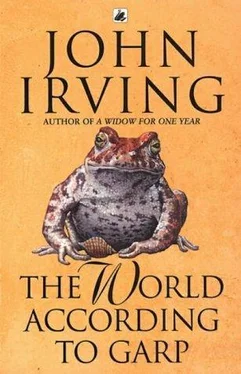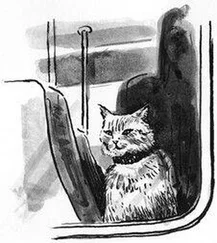Everything in New England is at least near everything else. They got to visit Jenny at the shore and Ernie at Steering. Garp would take Duncan to the Steering wrestling room and roll him around like a ball. “This is where your daddy wrestled,” he told him.
“It's where your daddy did everything ,” Helen told Duncan, referring—of course—to Duncan's own conception, and to her first rainy night with Garp in the locked and empty Seabrook Gymnasium, on the warm crimson mats stretching wall to wall.
“Well, you finally got me,” Helen had whispered to him, tearfully, but Garp had sprawled there, on his back on the wrestling mat, wondering who had gotten whom .
When Jenny's mother died, Jenny visited Helen and Garp more frequently, though Garp objected to what he called his mother's “entourage.” Jenny Fields traveled with a small core of adorers, or with occasional other figures who felt they were part of what would be called the women's movement; they often wanted Jenny's support or her endorsement. There was often a case or a cause that needed Jenny's pure white uniform on the speaker's platform, although Jenny rarely spoke very much or for very long.
After the other speeches, they would introduce the author of A Sexual Suspect . In her nurse's uniform, she was instantly recognizable. Into her fifties, Jenny Fields would remain an athletically attractive woman, crisp and plain. She would rise and say, “This is right.” Or, sometimes, “This is wrong"—depending on the occasion. She was the decision maker who'd made the hard choices in her own life and therefore she could be counted on to be on the right side of a woman's problem.
The logic behind all this made Garp fume and stew for days, and once an interviewer from a women's magazine asked if she could come interview him about what it was like to be the son of a famous feminist. When the interviewer discovered Garp's chosen life, his “housewife's role,” as she gleefully called it, Garp blew up at her.
“I'm doing what I want to do,” he said. “Don't call it by any other name. I'm just doing what I want to do—and that's all my mother ever did, too. Just what she wanted to do.”
The interviewer pressed him; she said he sounded bitter. Of course, it must be hard, she suggested, being an unknown writer with a mother whose book was known around the world. Garp said it was mainly painful to be misunderstood, and that he did not resent his mother's success; he only occasionally disliked her new associates. “Those stooges who are living off her,” he said.
The article in the women's magazine pointed out that Garp was also “living off” his mother, very comfortably, and that he had no right to be hostile toward the women's movement. That was the first time Garp heard of it: “the women's movement.”
It was not many days after this that Jenny came to visit him. One of her goons, as Garp called them, was with her: a large, silent, sullen woman who lurked in the doorway of Garp's apartment and declined to take her coat off. She looked warily at little Duncan, as if she awaited, with extreme displeasure, the moment when the child might touch her.
“Helen's at the library,” Garp told Jenny. “I was going to take Duncan for a walk. You want to come?” Jenny looked questioningly at the big woman with her; the woman shrugged. Garp thought that mother's greatest weakness, since her success, was to be, in his words, “used by all the crippled and infirm women who wished they'd written A Sexual Suspect , or something equally successful.”
Garp resented standing cowed in his own apartment by his mother's speechless companion, a woman large enough to be his mother's bodyguard. Perhaps that's what she is, he thought. And an unpleasant image of his mother with a tough dyke escort crossed his mind—a vicious killer who would keep the men's hands off Jenny's white uniform.
“Is there something the matter with that woman's tongue , Mom?” Garp whispered to Jenny. The superiority of the big woman's silence outraged him; Duncan was trying to talk with her, but the woman merely fixed the child with a quieting eye. Jenny quietly informed Garp that the woman wasn't talking because the woman was without a tongue. Literally.
“It was cut off,” Jenny said.
“Jesus,” Garp whispered. “How'd it happen?”
Jenny rolled her eyes; it was a habit she'd picked up from her son. “You really read nothing, don't you?” Jenny asked him. “You just never have bothered to keep up with what's going on.” What was “going on,” in Garp's opinion, was never as important as what he was making up—what he was working on. One of the things that upset him about his mother (since she'd been adopted by women's politics) was that she was always discussing the news .
“This is news , you mean?” Garp said. “It's such a famous tongue accident that I should have heard about it?”
“Oh, God,” Jenny said wearily. “Not a famous accident. Very deliberate.”
“Mother, did someone cut her tongue off?”
“Precisely.” Jenny said.
“Jesus,” Garp said.
“You haven't heard of Ellen James?” Jenny asked.
“No.” Garp admitted.
“Well, there's a whole society of women now,” Jenny informed him, “because of what happened to Ellen James.”
“What happened to her?” Garp asked.
“Two men raped her when she was eleven years old,” Jenny said. “Then they cut her tongue off so she couldn't tell anyone who they were or what they looked like. They were so stupid that they didn't know an eleven-year-old could write . Ellen James wrote a very careful description of the men, and they were caught, and they were tried and convicted. In jail, someone murdered them.”
“Wow,” Garp said. “So that's Ellen James?” he whispered, indicating the big quiet woman with new respect.
Jenny rolled her eyes again. “No,” she said. “That is someone from the Ellen James Society . Ellen James is still a child, she's a wispy-looking little blond girl.”
“You mean this Ellen James Society goes around not talking,” Garp said, “as if they didn't have any tongues?”
“No, I mean they don't have any tongues,” Jenny said. “People in the Ellen James Society have their tongues cut off . To protest what happened to Ellen James.”
“Oh boy,” Garp said, looking at the large woman with renewed dislike.
“They call themselves Ellen Jamesians,” Jenny said.
“I don't want to hear any more of this shit, Mom,” Garp said.
“Well, that woman there is an Ellen Jamesian,” Jenny said. “You wanted to know.”
“How old is Ellen James now?” Garp asked.
“She's twelve,” Jenny said. “It happened only a year ago.”
“And these Ellen Jamesians,” Garp asked, “do they have meetings, and elect presidents and treasurers and stuff like that?”
“Why don't you ask her?” Jenny said, indicating the lunk by the door. “I thought you didn't want to hear any more about it.”
“How can I ask her if she doesn't have a tongue to answer me?” Garp hissed.
“She writes ,” Jenny said. “All Ellen Jamesians carry little note pads around with them and they write you what they want to say. You know what writing is, don't you?”
Fortunately, Helen came home.
Garp would see more of the Ellen Jamesians. Although he felt deeply disturbed by what had happened to Ellen James, he felt only disgust at her grown-up, sour imitators whose habit was to present you with a card. The card said something like:
Hello, I'm Martha. I'm an Ellen Jamesian. Do you know what an Ellen Jamesian is?
Читать дальше












